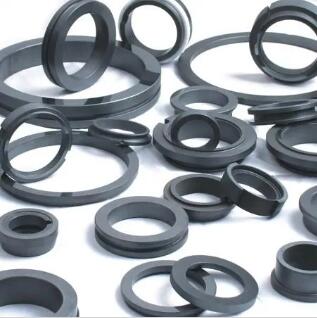Understanding Silicon Carbide Mechanical Seal Rings: Applications and Benefits
2024-09-04
Silicon carbide (SiC) mechanical seals are critical components in various industrial applications, providing durability, reliability, and superior performance in harsh environments. Known for their exceptional hardness, chemical resistance, and thermal stability, SiC mechanical seal rings are widely used in pumps, compressors, and other rotating equipment. In this blog, we’ll explore the applications, benefits, and key properties of silicon carbide mechanical seal rings.
1. What Are Silicon Carbide Mechanical Seal Rings?
Silicon carbide mechanical seal rings are components used to prevent fluid leakage in rotating machinery. These seals work by creating a tight seal between the rotating shaft and the stationary housing, preventing fluids (such as water, oil, or chemicals) from escaping. The silicon carbide material is a ceramic compound made from silicon and carbon, known for its high hardness, thermal conductivity, and chemical inertness. These properties make SiC an ideal material for mechanical seals used in challenging environments.
2. Key Properties of Silicon Carbide
- Hardness and Wear Resistance: Silicon carbide is one of the hardest materials available, second only to diamond. This exceptional hardness gives SiC mechanical seal rings outstanding wear resistance, which is crucial for extending the lifespan of seals in abrasive or high-speed applications.
- Thermal Stability: SiC has excellent thermal conductivity and can withstand high temperatures without deforming or losing its mechanical properties. This makes it ideal for use in high-temperature environments where other materials might fail.
- Chemical Inertness: Silicon carbide is chemically inert, meaning it does not react with most chemicals. This property is particularly important in industries where mechanical seals are exposed to corrosive fluids, such as in chemical processing or oil and gas applications.
- Low Friction: SiC has a low coefficient of friction, reducing wear on the sealing surfaces and improving the efficiency of the machinery.
3. Applications of Silicon Carbide Mechanical Seal Rings
- Pumps: Silicon carbide mechanical seals are commonly used in pumps that handle abrasive or corrosive fluids, such as slurry pumps, chemical pumps, and seawater pumps. The wear resistance and chemical stability of SiC make it ideal for these demanding applications.
- Compressors: In compressors, SiC mechanical seals provide reliable sealing in high-pressure and high-temperature conditions. They are often used in gas compressors for the oil and gas industry, where performance and safety are paramount.
- Rotary Equipment: Silicon carbide seals are used in various rotating equipment, including mixers, agitators, and reactors, where they help maintain the integrity of the process by preventing fluid leakage and contamination.
- Automotive and Aerospace: SiC seals are also found in high-performance automotive and aerospace applications, where their durability and resistance to extreme conditions ensure the reliability of critical systems.
4. Benefits of Using Silicon Carbide Mechanical Seal Rings
- Extended Service Life: The exceptional hardness and wear resistance of silicon carbide extend the service life of mechanical seals, reducing the need for frequent replacements and lowering maintenance costs.
- Enhanced Performance: SiC seals maintain their integrity in harsh environments, ensuring consistent performance and reliability in demanding applications.
- Cost-Effective: Although SiC mechanical seals may have a higher initial cost compared to other materials, their durability and long service life result in lower overall costs due to reduced downtime and maintenance.
- Environmental Resistance: The chemical inertness of silicon carbide makes it suitable for use in environments where other materials might degrade, ensuring the longevity and effectiveness of the seals.
Conclusion
Silicon carbide mechanical seal rings are a crucial component in many industrial applications, offering unmatched durability, thermal stability, and chemical resistance. Their ability to perform in harsh environments makes them a valuable asset in industries ranging from chemical processing to automotive and aerospace. By understanding the properties and benefits of SiC mechanical seals, industries can make informed decisions that enhance the reliability and efficiency of their equipment.



